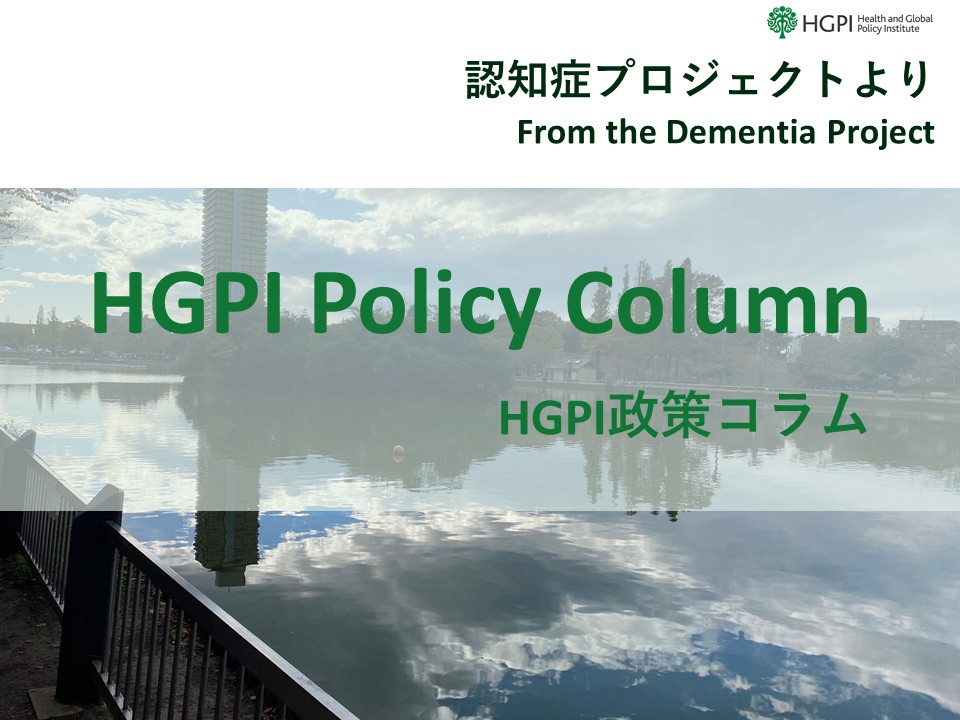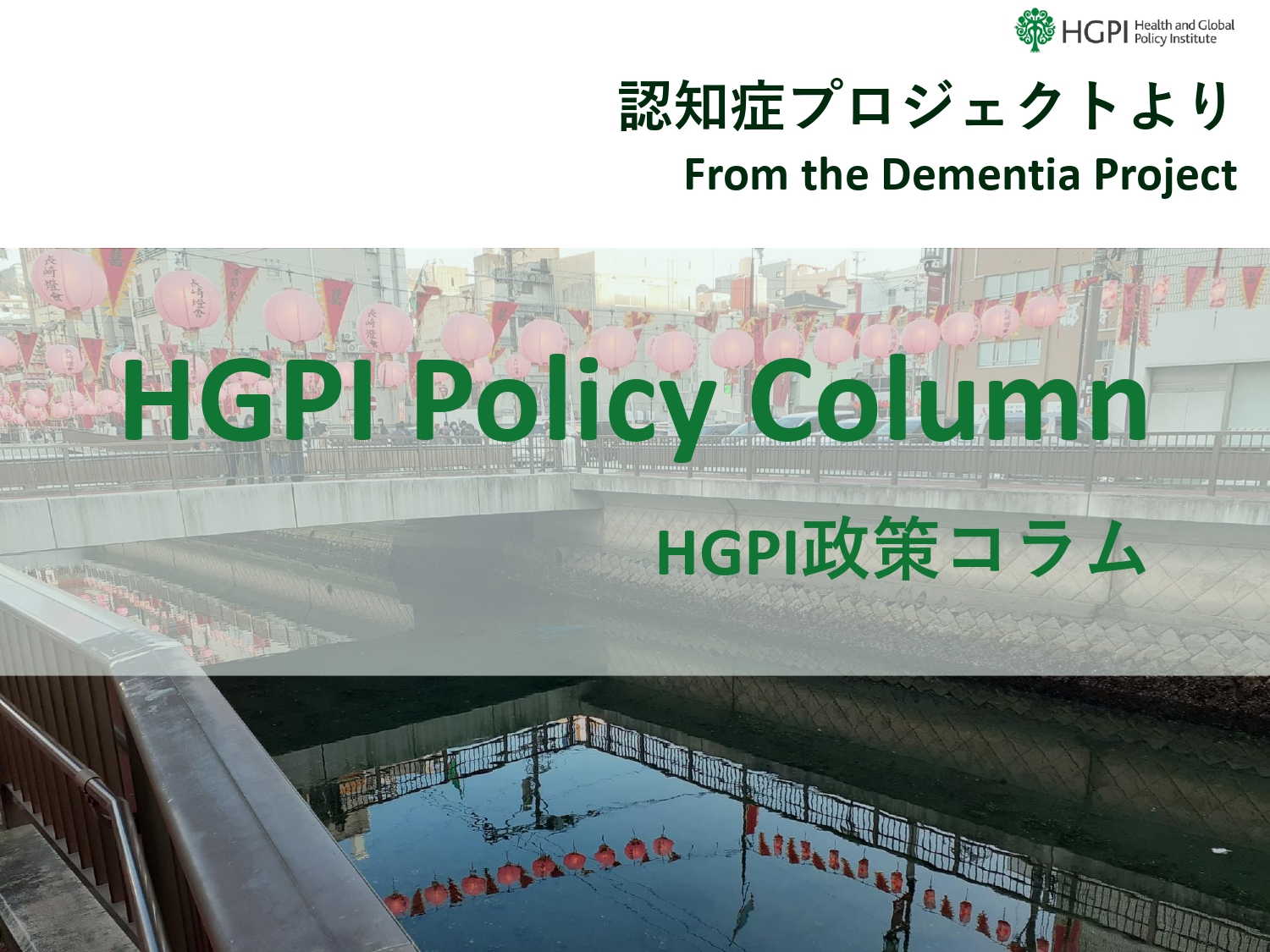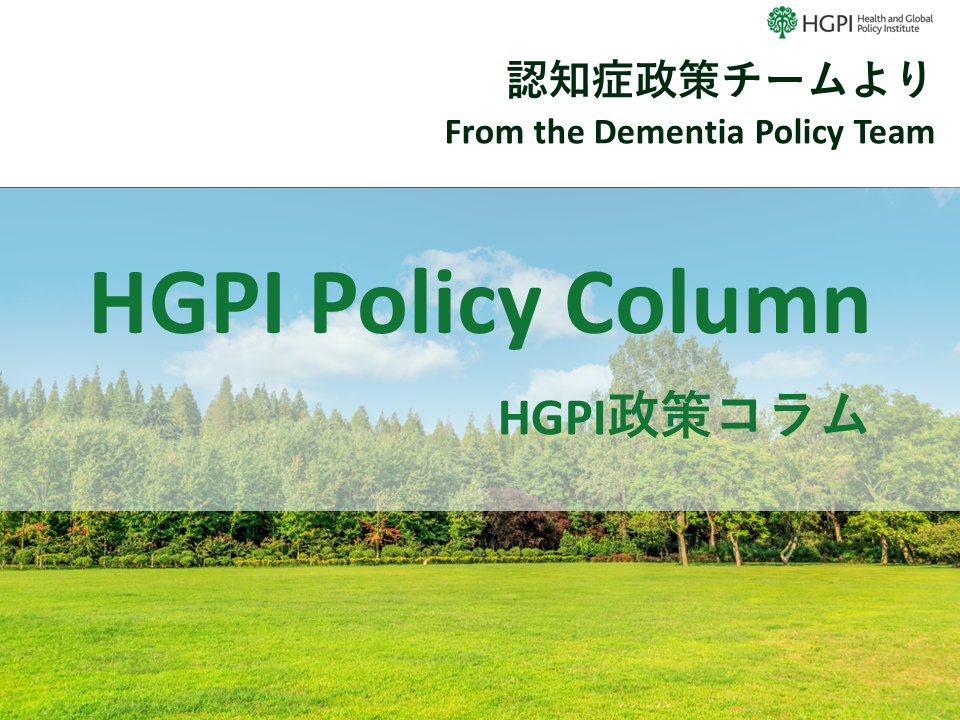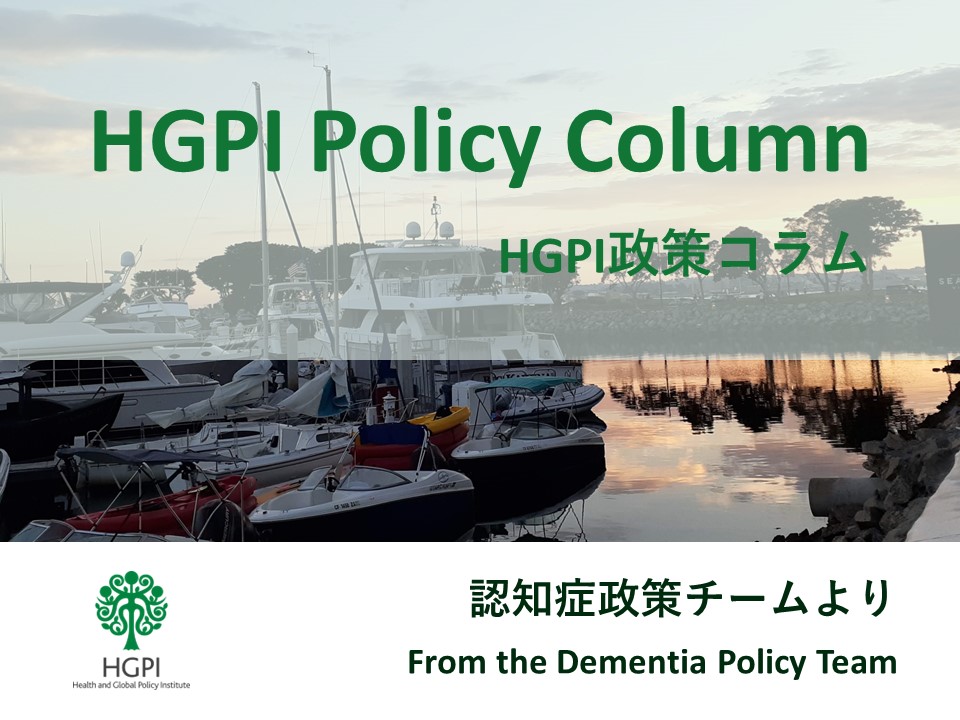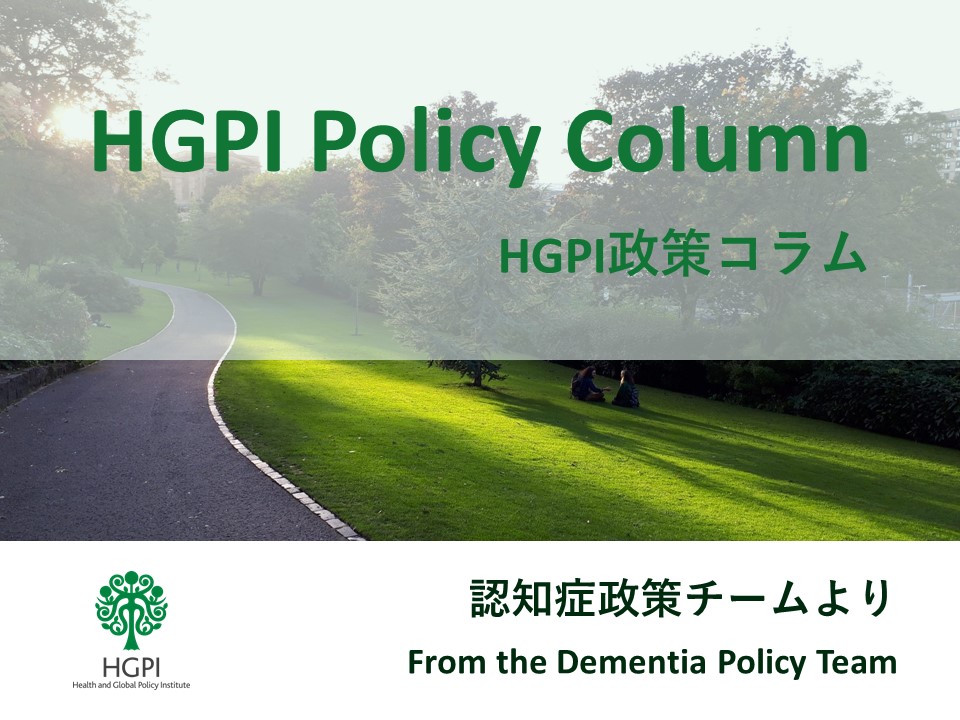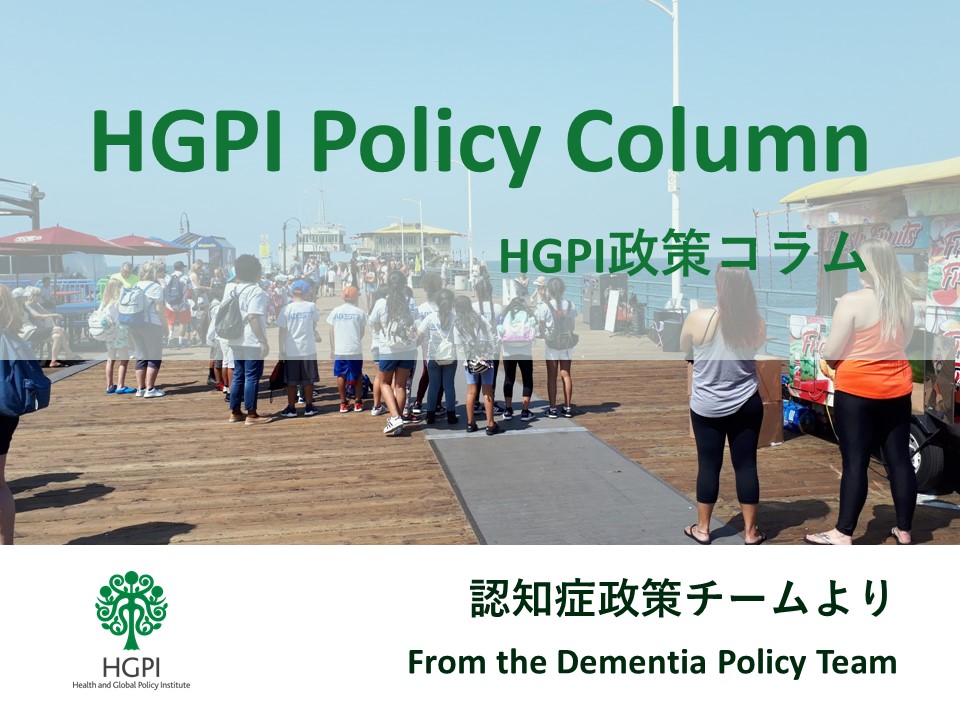[HGPI Policy Column] (No. 62) From the Dementia Project “The Current State of Dementia Policy in the International Community in 2025”
date : 7/4/2025
Tags: Dementia, HGPI Policy Column
![[HGPI Policy Column] (No. 62) From the Dementia Project “The Current State of Dementia Policy in the International Community in 2025”](https://hgpi.org/en/wp-content/uploads/sites/2/column-62-top.png)
<POINTS>
- On May 22, 2025, Alzheimer’s Disease International (ADI) presented their annual report on progress on national dementia plans (NDPs). This year, the report is titled, “From Plan to Impact VIII – Time to deliver.”
- Fifty-three countries and regions have formulated NDPs; of these, 45 are World Health Organization (WHO) Member States. The WHO aimed to have 75% of WHO Member States complete the development of NDPs by 2025, and ADI has called upon WHO Member States to support a six-year extension of this deadline to 2031. (This request was later approved at the WHO General Assembly, after the 2025 ADI Report was released.)
- This year, Japan’s NDP was determined to be, “Stage 5B: Plan adopted, funded, and monitored,” the same stage as last year.
From Plan to Impact VIII
This column will introduce, “From Plan to Impact VIII – Time to deliver,” the annual report presented by Alzheimer’s Disease International (ADI) on May 22, 2025. (Hereinafter, it will be referred to as “the 2025 ADI report.”)
ADI’s annual report summarizes progress on national dementia plans (NDPs) and strategies in each country and region and shares notable examples from among those plans, making it a valuable resource for tracking progress in dementia policy worldwide. HGPI’s Policy Column discussed each of the previous reports, from 2020 to 2024, making this column our sixth installment in this series.
The Current State of Dementia Policy in the International Community (July 2020)
The Current State of Dementia Policy in the International Community in 2021 (June 2021)
The Current State of Dementia Policy in the International Community in 2022 (September 2022)
The Current State of Dementia Policy in the International Community in 2023 (August 2023)
The Current State of Dementia Policy in the International Community in 2024 (August 2024)
ADI requests an extension of the deadline on NDPs to 2031 for continued progress
The survey conducted for the 2025 ADI report found that as of May 2025, 53 countries and regions had already developed NDPs. Among them, 45 countries were WHO Member States. Of those 45 Member States, 21 are in Europe; 9 are in the Americas; 9 are in the Western Pacific (including Japan); 4 are in the Eastern Mediterranean; 2 are in Southeast Asia; and 0 are in Africa.
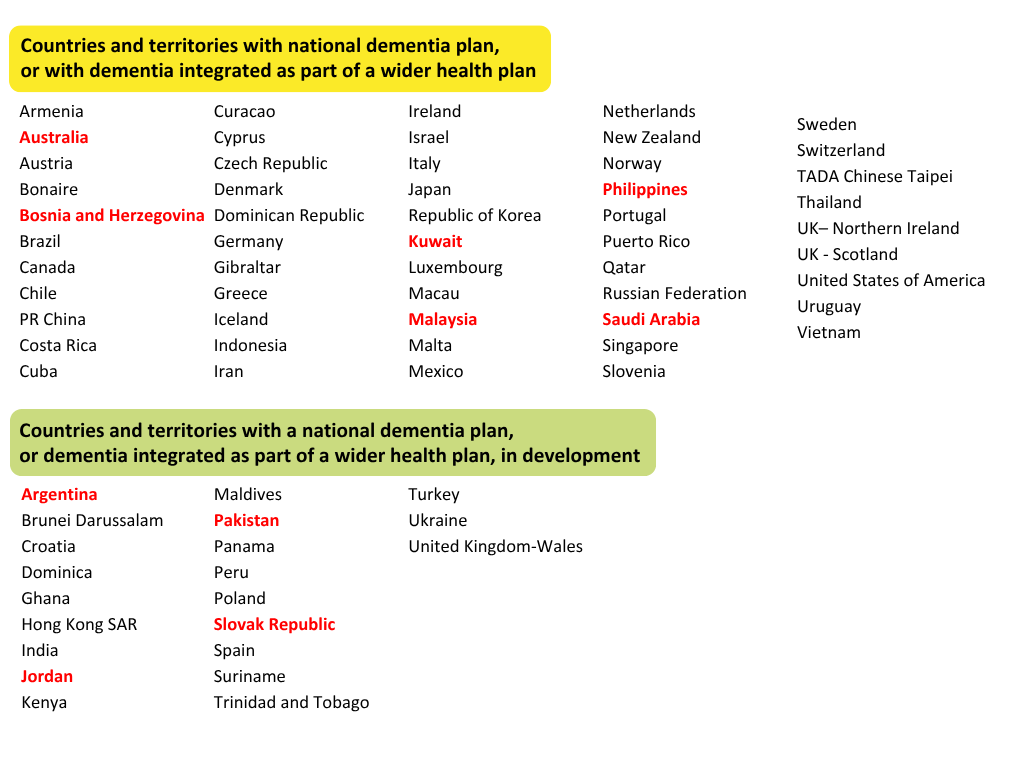
Fig. 1
In 2017 the WHO presented the “Global action plan on the public health response to dementia 2017-2025” (hereinafter, “the WHO Action Plan”), which states, “75% of countries will have developed or updated national policies, strategies, plans or frameworks for dementia, either stand-alone or integrated into other policies/plans, by 2025.” The number of countries that have developed NDPs has increased from 39 Member States last year to a current total of 45 Member States this year, but this figure only represents 23.2% of the 194 Member States that have endorsed the WHO Action Plan. In short, these efforts still fall short of the initial goal.
There has been significant progress in dementia research since the WHO Action Plan was first presented in 2017, and 55 countries and regions have now developed NDPs, the most since ADI began tracking progress. However, these efforts face challenges including unprecedented cuts to research funding, deeply rooted stigma, and low diagnostic rates. In response to these circumstances, ADI is requesting that WHO Member States extend the WHO Action Plan deadline to 2031. (The 78th World Health Assembly (WHA) later agreed to this extension.)
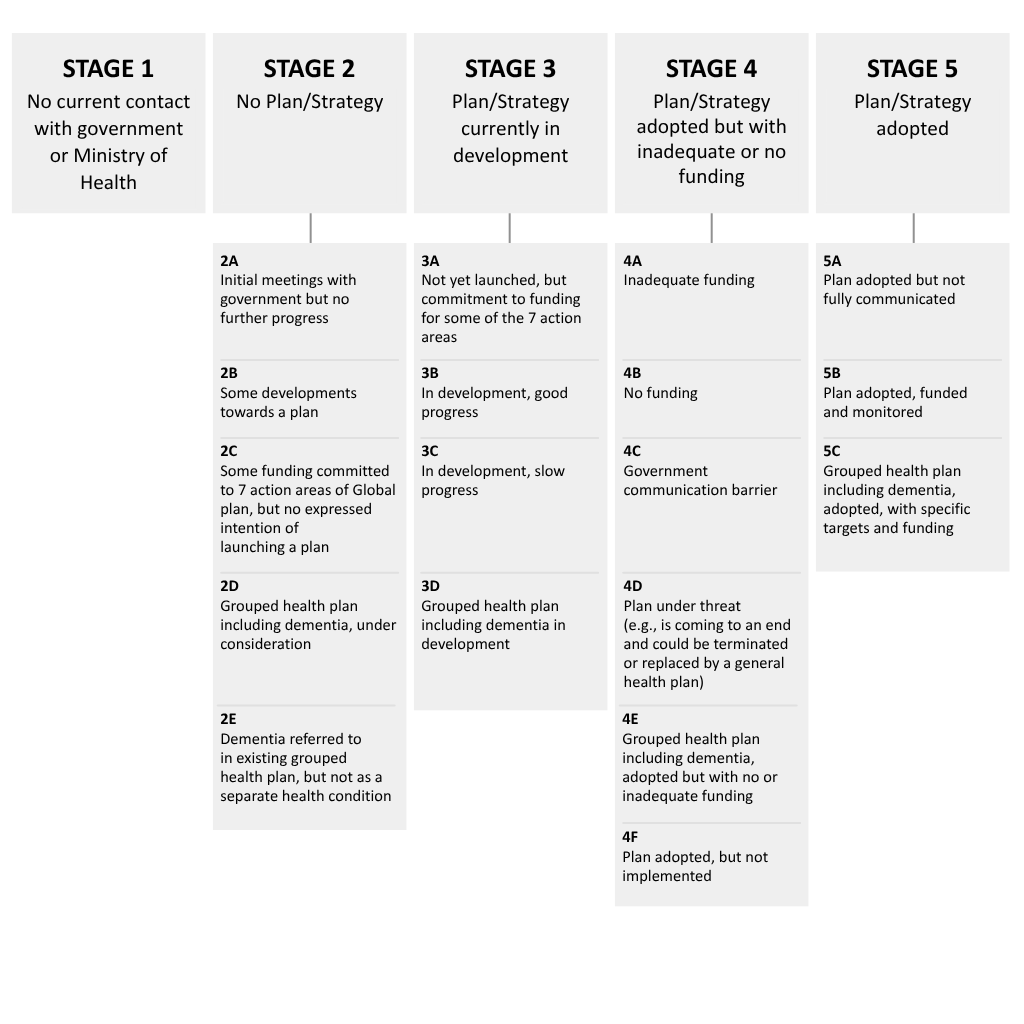
Fig. 2
In 2025, Japan’s NDP was once again, “Stage 5B: Plan adopted, funded, and monitored.” As a good example of planning, the 2025 ADI Report includes an introduction of Japan’s multifaceted approach that reflects the voices of people living with dementia in policy (including the Basic Act on Dementia to Promote an Inclusive Society enacted in 2023 and the Basic Plan for the Promotion of Policies on Dementia adopted in 2024, both of which are mentioned). As the country where population aging has advanced the most, the report highlights Japan’s efforts as a model for societies where population aging will accelerate in the future. It also discusses the legal empowerment process that enables people living with dementia and their caregivers to exercise their rights and take part in decision-making, and mentions the Japan Dementia Working Group (JDWG), Alzheimer Association Japan (AAJ), and HGPI as organizations fulfilling important roles in that process.
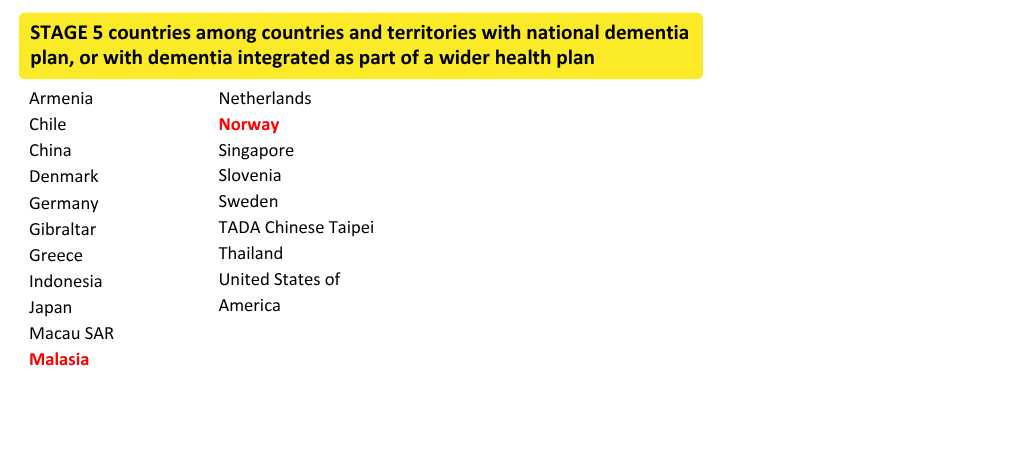
Fig. 3
Among countries and regions that have already developed NDPs shown above, Fig. 3 shows which countries and regions have NDPs determined to be “Stage 5” in ADI’s evaluation index. Comparing this list with the 2024 ADI report, we see that Austria, Canada, Cuba, and Puerto Rico are not included in “Stage 5,” while Malaysia and Norway are new additions. In other words, this year’s survey found that several countries and regions that were previously included in “Stage 5” have fallen behind. The 2025 ADI Report also discusses how multiple urgent concerns around the world including changes in governments, economic and political crises, or fallout from the COVID-19 pandemic have made it more difficult to take action for an issue like dementia despite its wide-reaching and enormous impact on society due to its nature as a slowly developing disease that is difficult to place at the center of attention.
ADI states that it sees the WHO Action Plan as a “lodestar” for the dementia advocacy community while emphasizing the need for continued efforts to formulate NDPs because, despite being an issue that affects everyone, dementia is easily influenced by factors that extend beyond the individual, such as opportunities for diagnosis, treatment, and care, or access to support. ADI also hopes to see the WHO Action Plan extended to 2031, but reminds us that even if an extension is approved and more time is granted, we must remain vigilant in our efforts.
In conclusion
To conclude this column’s introduction of the content of the 2025 ADI Report, we note that while the number of countries and regions formulating NDPs had stagnated since 2022, it increased this year. The WHO estimates that the number of people living with dementia will increase to 139 million people by 2050 and that the annual global cost of dementia will rise to US $2.8 trillion by 2030. We believe the increase in countries and regions that have formulated NDPs will contribute to building a global collaborative framework for responding to these circumstances.
Despite progress on the policy front, the 2025 ADI Report expresses concern toward social conditions surrounding dementia research. Under the Trump administration, the National Institutes of Health (NIH) in the US began freezing or terminating grants for research related to diversity, equity, and inclusion (DEI), and there is a very real possibility that the impact of this decision will spill over into the area of dementia. Compared to when ADI presented its first policy assessment report in 2018, there has been significant progress in dementia research with the introduction of disease modifying therapies (DMTs) and blood biomarkers. These accomplishments were made because of enormous, ongoing investment in dementia research and the accumulated findings of years of research that investment has enabled. Securing continuous funding is essential for advancing dementia research. In the face of cuts to funding, ADI believes we must examine the risks posed by those cuts and intensify research efforts.
Even if there is progress in formulating NDPs, if research comes to a standstill, initiatives for dementia will be lacking. This is because highly-effective policies cannot be formulated without research-backed evidence, and failure to reflect such evidence means policies will become mere formalities. NIH is a world-leading research institution, and any decision by NIH to freeze or terminate funding will likely affect many countries and regions outside of the US. Rather than viewing it as someone else’s problem, we must keep a close eye on potential future impacts of any such decision.
Dementia is a concern for all of us. It is vital that we persevere in our efforts to improve the lives of people living with dementia, their family members, and all people, and this will require both policy and research to achieve. In our capacity as a non-profit, independent, non-partisan private think tank, HGPI will continue devoting itself to the creation of a dementia-inclusive society by uniting diverse stakeholders, generating policy recommendations, and engaging in advocacy activities.
Column author
Shoko Nakazato (Intern, HGPI)
Top Research & Recommendations Posts
- [Policy Recommendations] The Path to a Sustainable Healthcare System: Three Key Objectives for Public Deliberation (January 22, 2026)
- [Research Report] Perceptions, Knowledge, Actions and Perspectives of Healthcare Organizations in Japan in Relation to Climate Change and Health: A Cross-Sectional Study (November 13, 2025)
- [Research Report] The 2025 Public Opinion Survey on Healthcare in Japan (March 17, 2025)
- [Policy Recommendations] Reshaping Japan’s Immunization Policy for Life Course Coverage and Vaccine Equity: Challenges and Prospects for an Era of Prevention and Health Promotion (April 25, 2025)
- [Research Report] The 2023 Public Opinion Survey on Satisfaction in Healthcare in Japan and Healthcare Applications of Generative AI (January 11, 2024)
- [Research Report] AMR Policy Update #4: Cancer Care and AMR (Part 1)
- [Policy Recommendations] Developing a National Health and Climate Strategy for Japan (June 26, 2024)
- [Public Comment Submission] “Assessment Report on Climate Change Impacts in Japan (Draft Overview)” (December 24, 2025)
- [Research Report] Survey of Japanese Physicians Regarding Climate Change and Health (December 3, 2023)
- [Research Report] The Public Opinion Survey on Child-Rearing in Modern Japan (Final Report) (March 4, 2022)
Featured Posts
-
2026-01-09
[Registration Open] (Hybrid Format) Dementia Project FY2025 Initiative Concluding Symposium “The Future of Dementia Policy Surrounding Families and Others Who Care for People with Dementia” (March 9, 2026)
![[Registration Open] (Hybrid Format) Dementia Project FY2025 Initiative Concluding Symposium “The Future of Dementia Policy Surrounding Families and Others Who Care for People with Dementia” (March 9, 2026)](https://hgpi.org/en/wp-content/uploads/sites/2/dementia-20260309-top.png)
-
2026-02-05
[Registration Open] (Webinar) The 141st HGPI Seminar “Current Status and Future Prospects of Korea’s Obesity Policy: Voices of People with Lived Experience in Policy Promotion” (March 3, 2026)
![[Registration Open] (Webinar) The 141st HGPI Seminar “Current Status and Future Prospects of Korea’s Obesity Policy: Voices of People with Lived Experience in Policy Promotion” (March 3, 2026)](https://hgpi.org/en/wp-content/uploads/sites/2/hs141-top-1.png)
-
2026-02-06
[Research Report] AMR Policy Update #5: Cancer Care and AMR (Part 2)
![[Research Report] AMR Policy Update #5: Cancer Care and AMR (Part 2)](https://hgpi.org/en/wp-content/uploads/sites/2/HGPI_20260204_AMR-Policy-Update-5.png)




